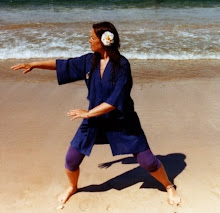ACR: Traditional Chinese Exercise Beats Stretching for Arthritic Knees
SAN FRANCISCO, Oct. 27 -- For obese patients with osteoarthritis of the knee, stretching exercises can't beat the pain relieving power of Tai Chi's graceful movements and peaceful frame of mind, researchers found.
The ancient Chinese martial art-turned-exercise improved pain scores three-fold better than stretching plus wellness education (P=0.0004), Chenchen Wang, M.D., of Tufts University in Boston, and colleagues reported here at the American College of Rheumatology meeting.
Because no weight loss was recorded for either group in the small randomized trial, the results were likely related to increased muscle strength and flexibility, Dr. Wang said.
The meditation, deep breathing, and relaxation involved may also benefit patients with this kind of chronic condition, she added.
Action Points
Note that Tai Chi is a traditional Chinese martial art that combines meditation with slow, gentle movements, deep breathing, and relaxation.
Note that this study was published as an abstract and presented orally at a conference. These data and conclusions should be considered to be preliminary until published in a peer-reviewed journal.
Osteoarthritis involves a catch-22 of interlinked pain, muscle weakness, structural damage, and lack of self-efficacy that leads to disability, Dr. Wang said.
Tai Chi has been advocated by the Arthritis Foundation as a form of exercise without the kind of deep bending or squatting moves that can be hard on the knees.
Although the Sun style of Tai Chi in the Arthritis Foundation's program emphasizes strength more than the Yang style used in the study, all Tai Chi styles share the same principles, Dr. Wang said.
This kind of complementary approach to treatment of osteoarthritis is promising, commented David A. Fox, M.D., of the University of Michigan Medical Center in Ann Arbor and ACR president.
Other types of exercise can also be effective in knee osteoarthritis, but "there's a lot going on in Tai Chi that could be something unique," said Dr. Fox, who was a moderator at the plenary session where the results were presented.
Dr. Wang's group studied 40 patients who met ACR criteria for knee osteoarthritis and had a body mass index of at least 40 kg/m2.
They were randomized to a 12-week intervention of one hour twice a week with either group Tai Chi sessions or stretching exercises plus education on osteoarthritis, diet and nutrition, and physical and mental health.
The groups were statistically similar at baseline, although the control group tended to have worse osteoarthritis and health status.
By the end of the exercise intervention, the stretching group remained fairly similar to baseline with a decrease of just 38.5 points on the 500-point WOMAC pain scale (95% confidence interval -87.2 to 10.3) whereas the Tai Chi group had a 157.3-point drop in pain (95% CI -198.5 to -116.0).
Among the secondary outcomes, the findings for Tai Chi compared with the stretching control group at 12 weeks included:
* Improved physical function scores (change -506.8 versus 182.2 on a 1,700-point scale, P=0.001)
* Better self-reported global functioning (change -3.0 versus -0.8 on a 10-point scale, P=0.003)
* Better physician-reported global functioning (change -3.2 versus -1.4 on a 10-point scale, P=0.0009)
* Improved chair stand test time (-12.0 versus -0.9 sec, P=0.0005)
* Increase self-efficacy (0.6 versus -0.1 on a scale of one to five, P=0.04)
* Greater reduction in depressive symptoms (-7.4 versus -0.7, P=0.009)
Among patients followed beyond the end of the intervention phase, the reduction in pain gradually faded with a borderline significant difference at 24 weeks (P=0.05) and a numerically but not statistically significant difference at 48 weeks (P=0.2).
Dr. Wang cautioned that the study was not double blind, which could raise concerns since -- as one audience member said during the question-and-answer session -- "some placebos are better than other placebos."
However, Dr. Wang's group tested the patients' outcome expectations and found no difference between the groups.
Dr. Wang reported support from the National Center for Complementary and Alternative Medicine and the National Center for Research Resources of the National Institutes of Health.
Dr. Fox reported no conflicts of interest.
http://www.medpagetoday.com/MeetingCoverage/ACR/11475
By Crystal Phend, Staff Writer, MedPage Today
Published: October 27, 2008
Reviewed by Zalman S. Agus, MD; Emeritus Professor
University of Pennsylvania School of Medicine
